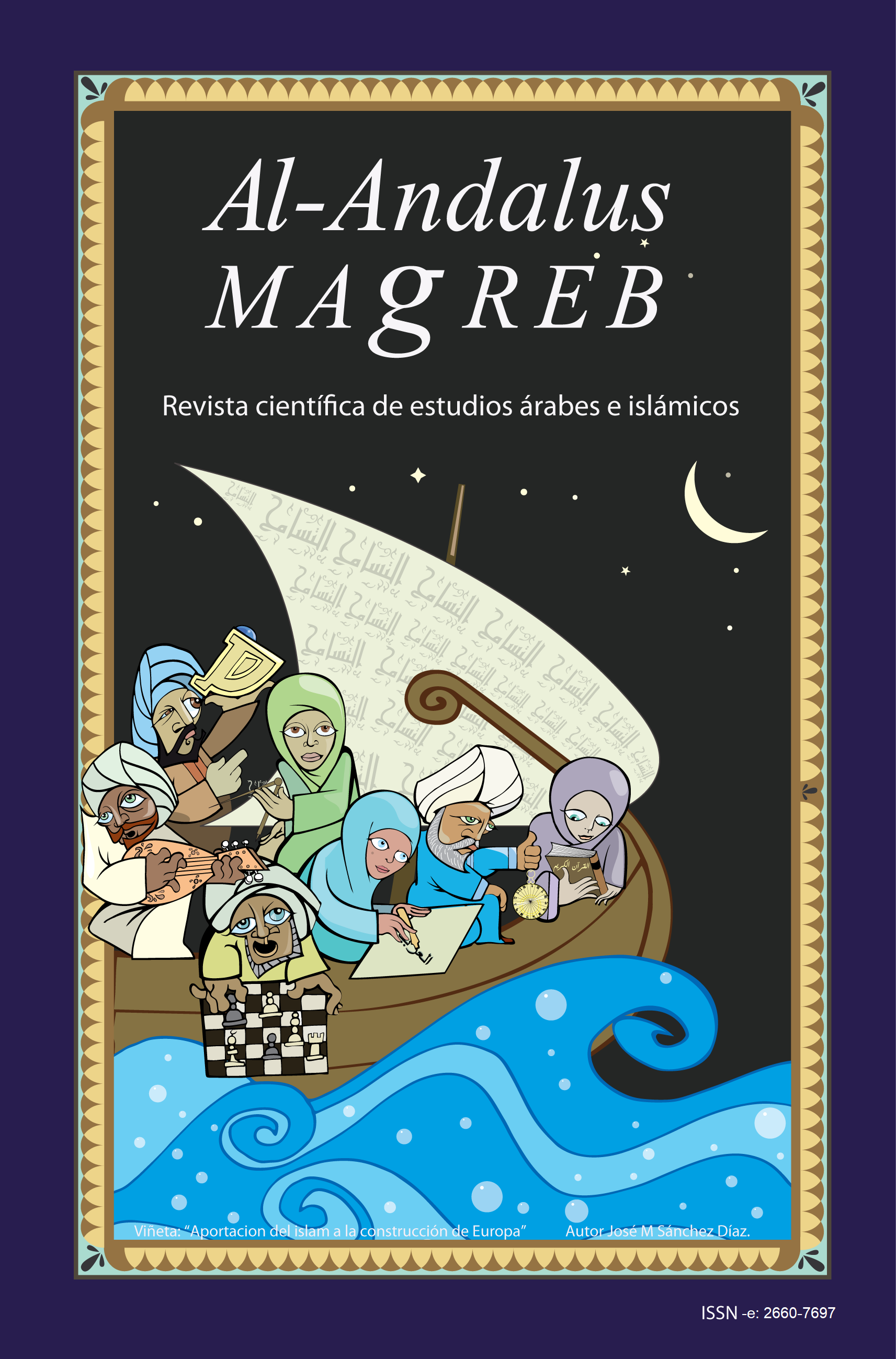The nepantla status of Dariya in Ceuta: between bastardy and inferiorization

Downloads
- PDF (Español (España)) 126
- EPUB (Español (España)) 76
- VISOR (Español (España))
- MOVIL (Español (España))
- XML (Español (España)) 82
DOI
https://doi.org/10.25267/AAM.2019.i26.8Info
Abstract
«The nepantla status of Dariya in Ceuta: between bastardy and inferiorization». To relinquish something so symbolically linked to the identity as the minorities groups’ language, succumbing to the great “assimilator machine” of the hegemonic and majority group, requires a pseudo-scientific account capable of overrating the dominant language’s value and undervaluing the subordinated one. A manipulative narrative affecting linguistic behaviors, influencing negatively on the perception, valuation and external behavior of the people to the marginalized language, such as the Ceuti Darija. The polyphonic and liminal reality of Ceuta needs a new grammar that could get over the simplistic and deficient binarism that, by means of a vertical approach, still grants privileges to one language and excludes others. These facts explain our predilection for categories produced from, with and for the South, like «transculturalism» and «nepantilism».
Keywords
Downloads
How to Cite
License

This work is licensed under a Creative Commons Attribution-NonCommercial-NoDerivatives 4.0 International License.
Those authors who have publications with this journal, accept the following terms:
a. Authors may retain their copyright and guarantee the journal the right of first publication of their work, which will be simultaneously subject to Licencia de reconocimiento de Creative Commons that allows third parties to share the work as long as its author is indicated. and its first publication this journal.
b. Authors may adopt other non-exclusive license agreements for the distribution of the version of the published work (eg: deposit it in an institutional electronic file) provided that the initial publication in this journal is indicated.
c. Authors are allowed and recommended to disseminate their work through the Internet (eg: in institutional telematic files or on their website) once the manuscript is accepted, which can lead to interesting exchanges and increase citations of the published work. (See El efecto del acceso abierto).
References
ABREU, A. I. Alberto. 2015. «Framing o teoría del encuadre en comunicación. Orígenes, desarrollo y panorama actual en España». En: Revista Latina de Comunicación Social 70, pp. 423-450.
ARIAS, Diego. 2007. Plan Decenal De Educación: Razones para dudar de sus alcances. En <http://viva.org.co/cajavirtual/svc0060/articulo05.pdf> [20 de enero de 2019].
CALVO SHADID, Annette. 2014. «Análisis de actitudes positivas y negativas hacia el habla costarricense». Revista Káñina 38, 2, pp.143-159.
CARULLA JANÉS, Judit. 2006. «Las actitudes hacia las lenguas y el aprendizaje lingüístico». En: Revista Interuniversitaria de Formación del Profesorado 20 (56), pp. 117-132.
DURÁN, Diego. 1984. Historia de las Indias de Nueva España. Vol. I. México, Porrúa.
ESTEBAN GUITART, Moisés, NADAL, Josep María, & VILA, Ignasi. 2007. «El papel de la lengua en la construcción de la identidad: un estudio cualitativo con una muestra multicultural». En: Glossa 2, 2, pp. 1-20.
HERNÁNDEZ-CAMPOY, Juan Manuel. 2004. «El fenómeno de las actitudes y su medición en sociolingüística». En Tonos digital: Revista electrónica de estudios filológicos 8, pp. 29-56.
HERRERO MUÑOZ-COBO, Bárbara. 2013. El árabe ceutí. Un código mixto reflejo de una identidad mestiza. Ceuta, Instituto de Estudios Ceutíes.
LEÓN-PORTILLA, Miguel. 1962. «Nepantla. La palabra clave de la tragedia de un pueblo». En: Periódico Excélsior, 23 de enero, México, D.F. (1976). México, Culturas en peligro, FCE.
MORENO-FERNÁNDEZ, Francisco. 1998. Principios de sociolingüística y sociología del lenguaje. Barcelona, Ariel.
−−− 2006. «Medias lenguas e identidad». En III Congreso Internacional de la Lengua Española, Rosario. En: Centro Virtual Cervantes. Consultado el: <https://cvc.cervantes.es/obref/congresos/rosario/ponencias/aspectos/moreno_f.htm> [04 junio de 2018]
RIVERA, Verónica. 2006. «Importancia y valoración sociolingüística del Darija en el contexto de la Educación Secundaria pública en Ceuta». En: Revista electrónica de estudios filológicos 12, pp. 1-21.
−−− 2011. «La lengua materna como elemento afectivo y base para el aprendizaje». En: Revista electrónica aula intercultural. En: <http://www.aulaintercultural.org/IMG/pdf/lenguamaterna-vrivera.pdf> [01 de marzo de 2018]
−−− 2012. El contacto de lenguas en Ceuta. Ceuta, Instituto de Estudios Ceutíes.
DE SOUSA SANTOS, Boaventura. 2009. Una epistemología del Sur: la reinvención del conocimiento y emancipación social. México, Siglo XXI - CLACSO.
−−− 2010. «Desigualdad, exclusión y globalización: hacia la construcción multicultural de la igualdad y la diferencia». En: Igualdad y no discriminación. El reto de la diversidad. Danilo Caicedo Tapia y Angélica Porras Velasco (eds.). Quito, Ministerio de Justicia, Derechos Humanos y Culto, pp. 3-51.
<https://eg.uc.pt/bitstream/10316/41728/1/Desigualdad%2C%20exclusi%C3%B3n%20y%20globalizaci%C3%B3n.pdf> [21 de octubre de 2019].
TRONCOSO PÉREZ, Ramón. 2011. «Nepantla, una aproximación al término». En: Tierras prometidas. De la colonia a la independencia. Castany, Bernat & al. (eds.). Barcelona, Centro para la Edición de los Clásicos Españoles-UAB, pp.375-398.
VELAZCO, Salvador. 1999. « Reconstrucciones historiográficas y etnicidades emergentes en el México colonial: Fernando de Alva Ixtlilxochitl, Diego Muñoz Camargo y Hernando Alvarado Tezozomoc». Mesoamérica, 20 (38), pp. 1-32.






